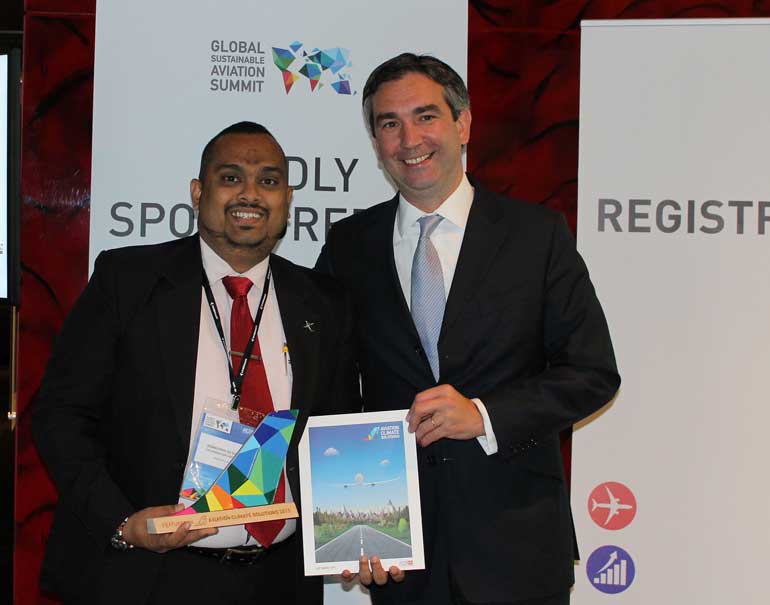Tuesday Feb 24, 2026
Tuesday Feb 24, 2026
Monday, 26 October 2015 00:00 - - {{hitsCtrl.values.hits}}
 Air Transport Action Group (ATAG) Executive Director Michael Gill with SriLankan Airlines’ Environmental Compliance and Planning Manager Dhanushka de Silva
Air Transport Action Group (ATAG) Executive Director Michael Gill with SriLankan Airlines’ Environmental Compliance and Planning Manager Dhanushka de Silva
SriLankan Airlines’ Voluntary Carbon Offset program ‘flygreen’, launched on World Environment Day, this year, has been recognised as one of the Aviation climate solutions by ATAG (Air Transport Action Group).
Implemented under the ‘Planet-friendly SriLankan’ initiative, this allows the airlines’ passengers to neutralise their individual carbon footprints by purchasing carbon credits. ‘flygreen’ program is monitored by IATA, and all its proceeds will be invested on a local conservation project in Sri Lanka, offering the environmentally conscious passengers the opportunity to contribute towards the airline’s sustainable practices.
Voicing his thoughts on ‘Greener Sustainability’ SriLankan Airlines Chairman Ajith Dias writes to the Airlines’ Environmental report, “SriLankan Airlines is dedicated and committed to promote environmental conservation and believes the Airline has the power to create a positive transformation.”
Michael Gill, Executive Director of the Air Transport Action Group, a cross-industry association that published the report, said: “Aviation plays a vital role in the world economy, providing connectivity for people and business. Our industry has also taken a lead in climate action, putting in place a comprehensive framework and goals to reduce emissions from air transport. The Aviation Climate Solutions are a set of case studies showing how different parts of the industry all over the world, including SriLankan Airlines are working together to reduce our climate impact.”
SriLankan’s Head of Human Resources and Convener of the Green task team, Pradeepa Kekulawala said, “SriLankan Airlines has been steering many planet-friendly initiatives to contribute to the reduction of the industry’s carbon footprint. In today’s context, aviation accounts for 3% off the total carbon emissions. With the increase in demand for air travel, aviation industry will keep expanding; hence, it is the responsibility of the stakeholders to revoke the repercussions of carbon emissions as a damage control measure.”
‘Aviation Climate Solutions’ was released at the Global Sustainable Aviation Summit in Geneva, Switzerland, alongside an open letter from industry chief executives which reaffirms the industry’s commitment to climate action; and calls on governments to support it with the development of a global market-based measure for aviation emissions, improved efficiency in air traffic management and accelerating research for alternative fuels and new technology.
In 2008, the aviation sector became the first to set global goals to proactively manage its climate change impact. The industry will stabilise its net CO2 emissions from 2020 through a concept called carbon-neutral growth, whereby traffic would continue to rise to meet the demands of society and the economy, but growth would be offset through a global market-based measure. The longer-term goal is to actually reduce net CO2 emissions from aviation to half of what they were in 2005, by 2050.
SriLankan Airlines has implemented many environmental programs under its ‘planet friendly SriLankan’ initiative. Under its signature project co-implemented with Whale and Dolphin Conservation UK, ‘Project BLUEprint’, SriLankan organised a series of training programs to promote responsible whale and dolphin watching among tour boat operators in coastal areas of Sri Lanka.
SriLankan also contributes towards the national framework on aviation and environment as a member of Aviation stakeholder working group, significantly contributing towards a national cause. Further, SriLankan has achieved many feats, which includes IATA IEnvA stage 01 compliance and consecutive National Energy awards in 2012, 2013.